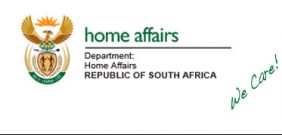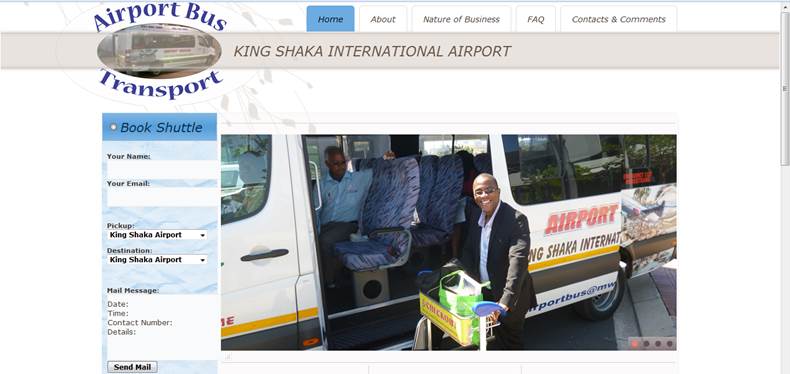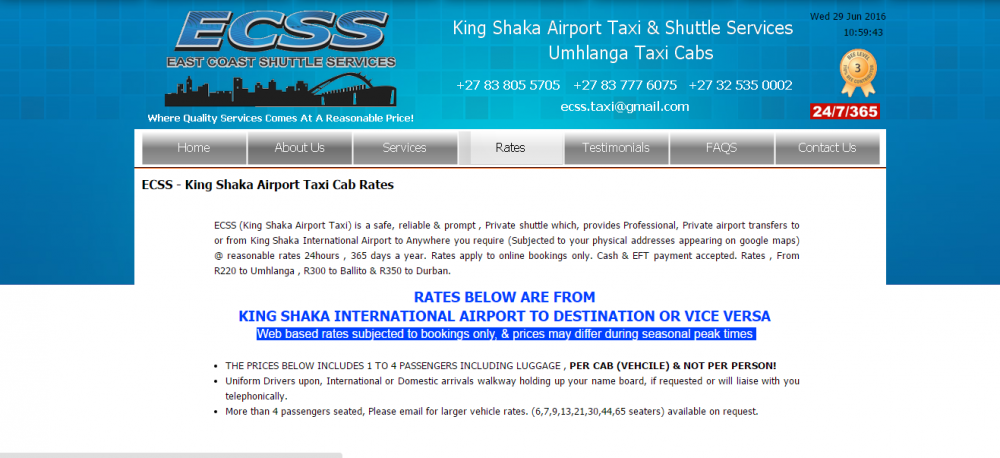General Information
Welcome desk at Durban King Shaka International Airport
From 7 until 14 September there will be a desk at the Durban airport where delegates are welcomed and shown their way.
The Welcome desk will be at the arrivals area at King Shaka International Airport in Durban next to Woolworths but it mostly depends on the delegates’ flight schedule.
Shuttles will be at the arrivals timed parking area for the entire time as well. Participants will pay for their own shuttle as agreed.
From Durban Airport to the city
Taxi:
Taxis are safe and relatively inexpensive. The metered taxis operate in all key zones. Registered metered taxis are clearly marked with a coloured sticker. Cost approx. R350 to Durban.
Airport Bus:
Buses depart approximately every 45 min from outside King Shaka International Airport – International Arrivals at Public Transport Parking.
Cost R80 per person to Durban. Tickets available on the bus. Hours of Operation 07h30 to 22h30.
There will also be a bus transporting delegates from the Official Hotels to the venue.
Venue Address
Durban ICC, 45 Bram Fischer Road, Durban 4001
Registration
at the venue, the Durban ICC.
You can already register on 11 September from 10:00 – 16:00. Please do so to avoid queuing at the registration desk in the morning of 12 September.
The registration desk will be open on all congress days.
Presentations
PPTs can be checked in in Meeting Room 12AB (on Ground Floor).
Exhibition
The exhibition will run during the whole congress.
Weather in Durban
Durban is a subtropical city with warm, humid summers (Jan-March) and mild, sunny winters (June-Aug) with an average max temperature of 28°C and 18°C.
In September spring is coming around the corner and average temperatures will be 20-26°C.
Please pack sunblock.
Drinking water
South Africa’s tap water is safe to drink.
Safety
Please see https://isocarp.org/app/uploads/2015/12/ISOCARP-Security-Statement.pdf
It is of course advisable to take the normal precautions when travelling in KwaZulu-Natal. Avoid display of cash and valuables, especially in isolated areas or when walking in poorly lit streets.
Money matters
ATMs are widespread and will accept most international bank and credit cards. Credit cards may be used at most hotels, restaurants, care hire companies etc.
SIM Cards
Major mobile service providers in South Africa are Vodacom, MTN, Cell C and 8ta.
Electricity
The South African electricity supply is 220/230 volts AC 50 HZ.
Power sockets: type C / D / M / N. For your country please check here.
Telephone numbers in Durban
– Emergency number police, fire and emergency: +27 (0) 31 361 0000
– Cellphone emergency number: 112.
Dress code
ISOCARP has no dress code. You might want to dress up a little for the gala dinner on 16 September. However, there are no obligations.
Languages
English and isiZulu are the main languages spoken in Durban.
Car rental and driving
Renting a car and driving yourself is the easiest way to get around. You drive on the left-hand side of the road. There are a number of car hire companies operating in Durban, with pick-up and drop-off zones at the airport and in most suburbs.
More practical information
http://www.southafrica.net/za/en/travel-tips/entry/travel-tip-getting-around
Traveller Tips
http://www.zulu.org.za/files/images/files/Travellers%20Tips.pdf
Links to useful brochures
http://www.zulu.org.za/files/useruploads/user_1/files/12061113_Travel%20Guide%20brochure_R1.pdf
http://www.zulu.org.za/files/useruploads/user_1/files/TKZN%20MAP_Lores.pdf http://www.zulu.org.za/about/latest-guides
South African Visas
Visitors’ visas are for international travellers (citizens of other countries) who have permanent residence outside South Africa and who wish to visit the country on a temporary basis for tourism or business purposes for a period of 90 days or less.
A visa simply indicates that your application has been reviewed at a South African embassy, mission or consulate and that the consular officer has determined you are eligible to enter the country for a specific purpose.
The visa will allow you to travel to a South African port of entry where an immigration official will then determine if you are allowed to enter South Africa and for how long you can stay for that particular visit. Visitors are restricted to the activity or reason for which their visas were issued.
On entry to South Africa, a visa is considered to be a visitor’s permit. The permit’s period of validity is calculated from the date of entry into the country and will be set out under the heading “conditions” on the visa label. You must ensure that you apply for the correct visa/permit. Entry in the country may be refused if the purpose of visit was not correctly stated.
Requirements for visitor’s visas differ from country to country (click here to see which countries are currently exempt), and the requirements are subject to change. As each application is treated as an individual case and you should make enquiries with your nearest South African mission or consulate abroad or any office of the Department of Home Affairs to see whether or not you are required to apply for a visa.
Remember that there is a fee charged for issuing a visa, and you should check the cost with the office as well as this is updated annually. The fee is payable in different currencies in different countries.
Visas are not issued at South African ports of entry, and airline officials are obliged to insist on visas before allowing passengers to board. If you arrive without a visa, immigration officials are obliged to put you onto a flight back to your home country.
Foreigners with long term status (work permits/permit residence) in the neighbouring countries who transit the Republic to return to their employment or residence are not subject to the transit visa, provided they are in possession of proof of their status.
South African visitors’ visas may be granted for:
- visits to family or friends and also for tourism purposes
- business purposes
- conferences
Documents required to apply for a visa
- A passport or travel document valid for no less than 30 days after the expiry of your intended visit
- Your passport must have at least TWO unused page for entry / departure endorsements
- A completed Form BI-84 (application for a visa)
- Payment of the prescribed fee
- A yellow-fever vaccination certificate (if required)
- Statement and/or documentation confirming the purpose and duration of your visit
- Two colour passport photographs
- A return or onward ticket if you are travelling by air
- Proof of financial means to pay for your living expenses while in South Africa in the form of:
- Bank statements
- Salary advances
- Undertakings by the host(s) in South Africa
- Bursary
- Medical cover or
- Cash available (including credit cards and travellers’ cheques)
You will need the following if you wish to visit South Africa:
- A valid and acceptable passport or travel document for your intended stay
- At least one blank page in your passport for endorsements
- A valid visa, if required
- Sufficient funds to pay for your day-to-day expenses during your stay
- A return or onward ticket
- Yellow fever certificates if your journey starts or entails passing through the yellow fever belt of Africa or South America.
Don’t forget that there are certain goods that you cannot bring into South Africa and other goods on which duties need to be paid.
For Customs requirements, click here: http://www.sars.gov.za/ClientSegments/Customs-Excise/Travellers/Pages/Arrival-in-SA.aspx
For Agricultural requirements, click here: http://www.daff.gov.za/daffweb3/Services/Imports
Source: http://www.home-affairs.gov.za/index.php/immigration-services/apply-for-a-south-african-visa
Best possible mode of travel to the place of residence from Durban airport.
Airport Bus Transport
Airport Taxi & Shuttle Service


